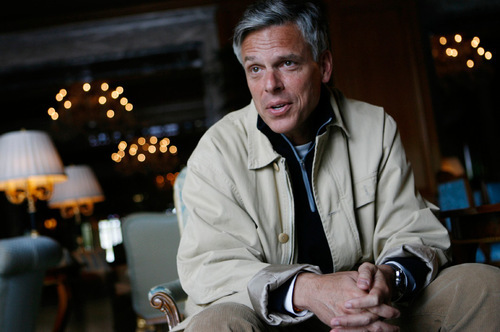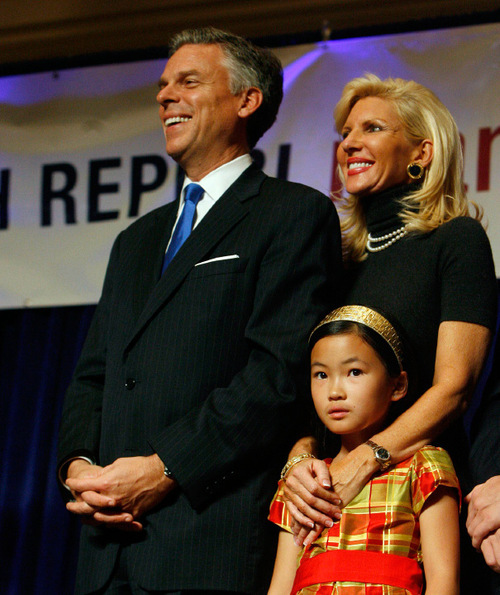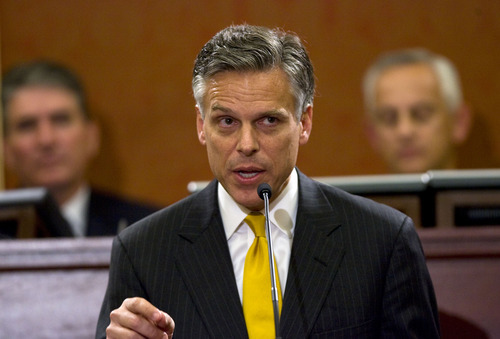This is an archived article that was published on sltrib.com in 2011, and information in the article may be outdated. It is provided only for personal research purposes and may not be reprinted.
Washington • In the anticipation of Jon Huntsman Jr. announcing a White House bid, various news outlets have described the former Utah governor as wealthy, rich and loaded.
There's no question Huntsman, Utah's former governor and the outgoing U.S. ambassador to China, has deep pockets — though they may not be as deep as some have suggested.
Huntsman's net worth ranges from $11 million to $74 million, according to a 2009 personal financial disclosure — the most recent available. Some of that wealth is set aside for his children and much of it is tied up in investments.
"The family name connotes wealth but I don't know that he's necessarily, personally uber-rich but that depends on your perspective," says Rep. Jason Chaffetz, a Utah Republican who served as Huntsman's first chief of staff. "He's got more money than most and less than some."
He's got a lot less than a couple of potential 2012 contenders.
Should he run for president, Huntsman probably would be a distant third in wealth behind developer and businessman Donald Trump and former Massachusetts Gov. Mitt Romney.
Forbes reported last year that Trump's net worth is north of $2 billion.
Romney, according to the disclosure filed in his 2008 White House bid, is worth between $190 million and $250 million, and that's in addition to a fund for his grandchildren valued between $70 million and $100 million.
In the 2008 presidential race, Romney plowed $45 million of his own fortune into his failed presidential race and later filed papers to say he didn't plan to pay himself back.
Huntsman would likely go bankrupt if he forked out that much on his own political aspirations. And it's also not his style.
Huntsman was cautious in tossing his own money into his two gubernatorial bids. In his 2004 campaign, Huntsman borrowed $300,000 from Zions Bank and he took out another $70,000 loan in 2008 to help fund his race. He paid back all the loans the same day he officially became the U.S. ambassador.
To be fair, Huntsman doesn't need to pinch pennies, though he may not want to burn any $100 bills, either.
Huntsman's father, Jon Huntsman Sr., founded Huntsman Corp., a multibillion-dollar, international company and he has consistently made the Forbes billionaire list until this year when the magazine said he dropped below the threshold.
Besides that, Huntsman Sr. has vowed to give away most of his riches to charity as part of a pledge drive pushed by investor Warren Buffett and the Bill and Melinda Gates Foundation.
Huntsman Jr., who is the eldest son, has a knack for frugality as anyone who has ever dined with him can attest.
The former governor's idea of a lunch meeting could either be a couple tacos from a street stand or a make-your-own-peanut-butter-and-jelly sandwich feast in his office.
Huntsman's biggest purchase came last year when he and wife, Mary Kaye, bought a $3.6 million home in a swanky Washington neighborhood.
Several other candidates can count themselves in the millionaire category, including former Alaska Gov. Sarah Palin and Mississippi Gov. Haley Barbour. Others are still a question mark, such as former Minnesota Gov. Tim Pawlenty and ex-House Speaker Newt Gingrich.
Of course, what a candidate has in his or her personal bank will not be as important as what the contender can bank in campaign donations.
Previous presidential hopefuls have thrown their own personal fortune in — Steve Forbes ponied up nearly $40 million in 2000, for example — but for the long-haul campaigns, the ability to attract donations from wealthy friends, connections and supporters is key.
President Barack Obama reportedly plans to raise $1 billion toward his 2012 re-election campaign, a figure never reached by a single candidate in U.S. election history. And that presents a big challenge to any potential opponent — rich or not.
Doug Heye, the former Republican National Committee communications director, notes wealth is helpful initially and after that, it's about the fund-raising.
"It's good in that it can provide a quick, short-term start-up infusion of cash, but once the campaign gets going it's really what you can raise," Heye says.
Wealth of candidates
If Jon Huntsman Jr. jumps into the presidential race, he probably would be the third wealthiest candidate.
Donald Trump has an estimated net worth of more than $2 billion.
Mitt Romney in 2008 reported assets of between $190 million and $250 million.







